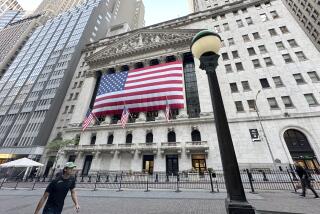Jitters About Yen, Bonds Cause Stocks to Tumble in Japan
- Share via
TOKYO — Share prices dropped sharply Friday on the Tokyo Stock Exchange, with the Nikkei average losing 653.36 points as investors responded to a bearish mood surrounding softening bond prices, a sagging currency and domestic political uncertainty.
The decline in the Nikkei 225-share index marked a return to a generally downward trend since the beginning of the year following a 473.62-point rally in Thursday’s trading.
Friday’s loss slightly exceeded the fall in prices after Wall Street’s mini-crash last Oct. 13 and was recorded as the eighth-largest drop ever in terms of absolute points. But with the index soaring astronomically in recent years, the decline of 1.7% was far from a significant mark in percentage terms, and it attracted scant attention in the local media.
Analysts attributed the fall in prices to a number of factors, including a weaker yen, which closed Friday in trading against the dollar in Tokyo at 145.35.
Also, a mood of caution was fueled by sinking bond prices, which have reacted negatively to rumors of higher interest rates. Bank of Japan Governor Yasushi Mieno in comments Friday reportedly left open the possibility of another hike in Japan’s official discount rate.
Yet the volume of trading in the Tokyo Stock Exchange’s first section was relatively thin, with only about 600 million shares changing hands. Trading volume of a billion shares a day is not unusual.
Investors appeared to be behaving cautiously before a three-day weekend, during which the market will remain closed. Monday is a national holiday here. Some investors appeared to be taking profits after Thursday’s rally, staying on the sidelines or selling defensively in anticipation of softer prices when trading resumes.
Political uncertainty is another theme that has dampened enthusiasm for Japanese shares. The lower house of Japan’s Parliament is expected to be dissolved by the end of the month, paving the way for a general election in February in which the ruling Liberal Democratic Party, which is conservative and pro-business, faces a serious challenge for its majority of seats.
The Nikkei average finished the week at 37,516.77 points, down 3% from its opening mark of 38,712.88 on the first day of trading this year.
The index has been hovering around the 38,000 mark since it broke that major psychological barrier in December, but some analysts predict that it will resume its skyward course and soar well above the 40,000 mark this year, reflecting Japan’s robust economic growth.
MAIN STORY: A1
More to Read
Inside the business of entertainment
The Wide Shot brings you news, analysis and insights on everything from streaming wars to production — and what it all means for the future.
You may occasionally receive promotional content from the Los Angeles Times.










